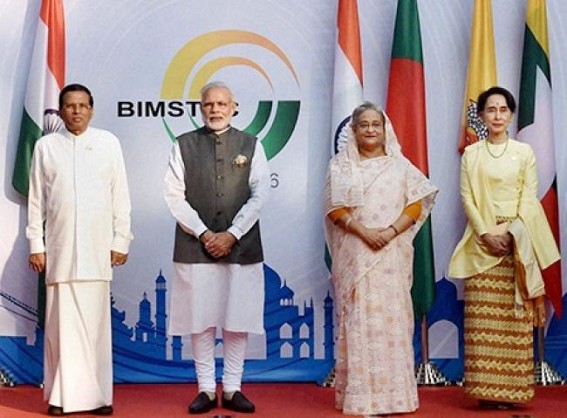Subir Bhaumik

PHOTO : IANS
Sheikh Hasina and Aung San Suu Kyi have much in common. They are daughters of great fathers who spearheaded the freedom struggles of their countries (and both lost their fathers early). Both fought bitter, protracted struggles against brutal military juntas to restore democracy in their countries. Both now run their countries but live under threat of conspiracies to unseat them, trying to control their powerful militaries and rising religious fundamentalist forces, often backed by men in uniform.
But they differ in some ways.
Suu Kyi married a British professor after her initial education in India where her mother served as ambassador of Burma (before it became Myanmar). Her style is sometimes more British than Burmese due to her Oxbridge education. Despite her long years in prison and successful leadership of the National League for Democracy (NLD) in sweeping the 2015 elections and coming to power, some say she is still coming to terms with the realities of a country ravaged by conflict and poverty. She is the daughter of Aung San, the independence war hero who tried to forge a stable federation with Myanmar's diverse people but was murdered, like Mahatma Gandhi, just when the country was attaining freedom.
Hasina survived the assassination of almost her entire family, spent some years in India before she returned to revitalise her father's Awami League party and bring down the military junta in a fierce street agitation. She led it to power for a term in 1996 and then again in 2008. After two terms in power and 11 assassination attempts, Hasina is a strong grassroots leader with a clear vision to make Bangladesh a middle-income country by 2021 and a developed economy by 2041. Once derided as a "basket case", Bangladesh has seen a steady 6 per cent plus GDP growth through her two terms in office (2009-14 and 2014 to now) in a world marked by economic downturn.
She has managed to control the army and enforce civilian supremacy, which Suu Kyi aspires to but has so far failed to do, as the recent Rakhine crisis seems to indicate. Hasina faces Parliament elections next year amid increased anti-incumbency and a refugee crisis that is stretching Bangladesh's meagre resources. Hasina's government has managed to handle nearly half a million Rohingyas who have taken refuge in Bangladesh after the brutal Burmese military crackdown that followed alleged jihadi attacks on August 24 against 30 police stations and one army base in northern Rakhine.
As Suu Kyi, a Nobel Laureate for her fight for democracy, stayed away from the UN General Assembly in the face of severe criticism, with some even suggesting that her Nobel Prize be taken back, Hasina has been striding the global stage confidently, winning nomination for the Nobel for her leadership in the fight against climate change and terrorism and all-round human development in her once-poor nation ravaged by frequent natural disasters.
Suu Kyi could emulate Hasina in at least three areas -- unleashing powerful forces of human and economic development, controlling the military and terrorist groups who often complement each other, and restoring a sense of national pride by resolving fractious domestic issues.
Both "Daughters of the East" represent the legacy of their great fathers and on their governance success and depth of vision depend the future of Asia's most strategic link region that connects South to Southeast and East Asia. It is time the two big Asian powers, India and China, step in to back both these women in their governance challenges against violent separatism, religious fundamentalism, poverty and refugee crisis.
(Subir Bhaumik can be reached at sbhaum@gmail.com) / IANS
- Why Modi’s BJP swept key India regional elections
- TIWN’s landmark legal victory against BJP Govt’s Illegal attacks to shutdown fearless Media
- India to be world's third-largest economy by 2030 -S&P Global Ratings
- Tripura's Dark Era : Mafia style Brutal attacks on Journalists, fight for your Citizen rights !
- How to access tripurainfoway.com via HOLA from India



